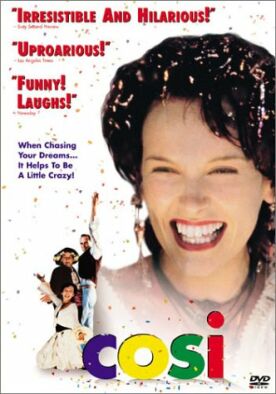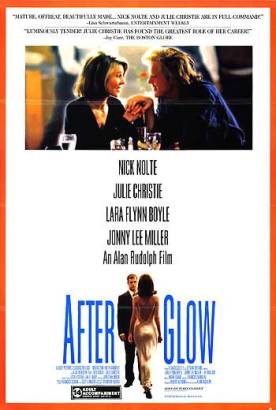Cosi
Cosi by Mark Joffe is the perfect Australian movie, containing as it does opera, insanity, coming of age and that most intricate of metaphysical questions: how to resolve the conflict between one’s girl and one’s mates. Based on a play by Louis Nowra, it stars Ben Mendelsohn as Lewis, a young college dropout who doesn’t really know what he wants to do and takes a job in a mental institution where he, a former drama student, is expected to assist with the inmates’ therapy by directing them in variety shows and the like. The scene of his hiring is the first funny thing, as he tells the director and two underlings who are interviewing him that he dropped out of university because he “wanted to experience a bit of life first” but that he is enormously ambitious to direct mental patient variety shows. We don’t see the interview of his sole rival for the job, a large woman with orange hair, a nose stud, and leather biker gear, but we do see the three officials of the institution flipping a coin and saying: “Heads, the dyke; tails, Orson Welles.”
Naturally Orson Welles gets the job. But his mission to stage a variety show is quickly hijacked by Roy (Tony Otto), a supposed former actor whose lifelong ambition it has been to stage a performance of Mozart’s Cosi fan tutte. Mainly because no one else cares enough about what they are doing to oppose his passionate interest in this project, they find themselves actually doing it — with a cast which includes a dangerous pyromaniac called Doug, a tongue-tied, fat, awkward, former lawyer called Henry, whom Roy is continually taunting as a failure, a young junkie called Julie (Toni Collette), an unbelievably uptight and suicidal middle aged woman called Ruth (Pamela Rabe), and a manic older woman, Cherry (Jacki Weaver), who imagines herself a young girl — and that Lewis is in love with her.
It is no doubt a dangerous thing to play around with, mental illness in a comic context. But the reason is precisely that mental illness is so inescapably comic. We feel guilty for laughing at what, we are persuaded, is not the poor dears’ fault, though at the same time we can hardly help it. We would rather avert our gaze — and accuse someone like Joffe or Nowra of bad taste for exploiting such a rich mine of humor. I myself am disposed to give them a lot of credit for running this risk without, I think, ever tipping over into mere bad taste. The film’s compassion for these comic loonies is always evident, and it is, as it is meant to be, a perfect complement to Mozart and da Ponte’s compassion for their characters — who might as well be mad, they make such fools of themselves.
Lewis’s private life is also a complement to the mad-house opera. He is living with a final year law-student called Lucy (Rachel Griffiths) when his best friend and fellow drama student, Nick (Aden Young), asks to move in with them. His own live-in girlfriend, Emma, has thrown him out after they each discovered the other in infidelity. Nick says that he was unfaithful to her only after he found out that she had been unfaithful to him and is disposed to a touch of misogyny after his experience with Emma. He bets Lewis, in an echo of the central incident of the opera, that Lucy will not be true to him, and then goes to work more or less subtly, while Lewis becomes more and more obsessed with his opera, to try to seduce her himself. As a more or less unconnected sidelight to all this, the three of them live in a flat that backs onto a piggery. At one point Nick looks out the window at the slaughterhouse in full production and says meditatively, “Pigs don’t die with any sort of grace, do they?”
Nick, who is directing his own play, called “Diary of a Madman” , also reflects on the irony of the two friends’ complementary lives: “You’re directing a show with madmen; I’m directing a show about madmen.” Though Nick’s play, in which he also stars, is awful, he fancies himself as a more experienced director and offers Lewis little hints on how to make his own production better. “The rule is this,” he tells him: “all actors are mad, even the mad ones.” The trick for dealing with them is to find the animal they are most like. The idiocy of this advice is immediately apparent when Lewis, in one of his many moments of desperation, tries it on the asylum patients.
Roy, who is supposed to have an extensive stage career behind him, is also patronizing and sometimes contemptuous toward Lewis. When the latter points out some of the difficulties of what Roy wants to accomplish, Roy replies: “I aim for the stars, Jerry (he calls him “Jerry” after Jerry Lewis); is that such a bad thing?” In the climactic scene, it is revealed that Roy is terrified with stage fright and that his theatrical career consists of once having worked as a stage electrician. Moreover, his professed reason for loving the opera, because its 18th century glitter reminds him of the genteel surroundings of his own childhood, including dances in “our ballroom,” also turns out to be bogus. He had been given up by his parents to an orphanage.
But the gap between Roy’s fantasy life, his exaggerated imagination of himself and the reality — so similar to the unhappy reality of the other patients — is almost bridged by Lewis’s production of the opera, which is a brilliant success in spite of Doug’s having burnt down the theatre (they convert the laundry room), the institutional authorities having forbidden any further work on it and having sacked Lewis (they work at night and in secret) and, of course, the many improvisations made necessary by things going so wrong.
Cosi fan tutte becomes for the mad and the sane alike precisely a way of restoring a primal state of elegance and perfection that no one has ever known, as Roy, perhaps, intuitively realizes. Lewis says something like this in coaxing Roy back to take his part in the production when he tells him that he has taught him to love the opera “with all my heart” because he has come to realize that it is “about real love.” Its magic works by convincing the audience, just for the two hours that they watch it, that “real love between two people is possible” in spite of the inevitable absurdity of the whole business — so exaggerated by the circumstances of its production here.
And at the same time as the drama’s one performance is taking place, to the enormous but increasingly gratifying surprise of the minister of health and the director of the institution, Lewis’s private life is reaching its own absurd point of crisis. Lucy announces that she is going to the law students’ ball with Nick because it happens on the same night as his show. Partly out of guilt for his own growing attraction to the rather bright but forlorn Julie, partly because of the bet, Lewis flares up and asks Lucy if she is sleeping with Nick. She in turn is enraged and suggests that they split up. Lewis says fine and hands her A$50 to give to Nick. “He’ll know what it’s for.” But both Nick and Lucy turn up at the show, Nick because Lucy gave him his marching orders after she found out about the bet and Lucy because she has suddenly decided to patch things up with Lewis.
There is more to this than just the personal rancor between them. Perhaps the most memorable scene in the movie is one in which Nick comes along to a rehearsal to give a bit more of his useless advice. By this time he is calling the opera “misogynistic crap” and trying to treat it as mere silliness and foolery. Unexpectedly, the tongue-tied stutterer, Henry, grows more and more enraged at Nick’s dismissive comments about the opera and finally explodes in a memorable defense of the idea that, in the middle of the comedy, there is a deadly serious point about love and fidelity. Nick, like the jerk that he is, tries to laugh this off and patronize Henry by saying that he is from “a different generation” and that the women in the play were “entitled to their fun” while the men were away at war. Henry, whose own mother had waited chastely for his father to come home from the war, is withering in his scorn and Nick, who had at one time seemed like a semi-serious character, never recovers.
This incident sets the stage for the split between Lewis and Nick after the latter confesses and tries to laugh off the fact that he attempted without success to get Lucy into bed. “Women,” he says to Lewis, “shouldn’t come between mates.”
“You’re not my mate,” says Lewis.
It is his way of breaking not only with Nick, but with his own immaturity and youthful frivolity about matters which, even when they are comic, are deadly serious.
Discover more from James Bowman
Subscribe to get the latest posts to your email.







